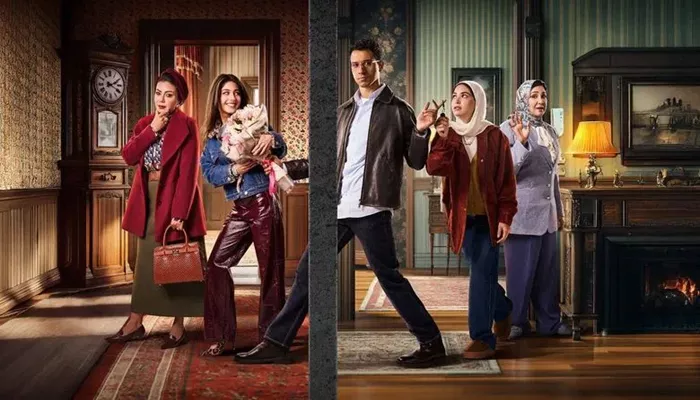The Ramadan TV series Half of the People Are Called Mohamed (Nos El-Shaab Esmo Mohamed) has ignited a wave of criticism, with many viewers and social media influencers questioning the series’ lack of depth and its handling of sensitive social issues. Directed by Abdel-Aziz El-Naggar, the comedic drama centers on the chaotic life of Mohamed (Essam Omar), a man who juggles multiple relationships without facing the consequences.
In the series, Mohamed, secretly married with a child, believes he can manage his two relationships—one with his wife and another with his fiancée, Sarah (Mayan El-Sayed)—without revealing his secrets. His elaborate plan begins to unravel as fate and meddling mothers collide, trapping Mohamed in a web of lies and deceit.
Despite the comedic premise, the show has been criticized for its shallow treatment of the issues it seeks to address. The plot, which remained stagnant throughout the series, lacks a deeper exploration of the social themes it touches on, leading to a sense of missed opportunity. One of the primary themes revolves around hypocrisy, a widespread issue in Egyptian society. The series critiques the tendency to mask one’s flaws, especially through the lens of religious piety, while engaging in morally questionable behavior.
The writer, Mohamed Ragaa, uses the common name “Mohamed” as a symbolic tool, creating a scenario where various people discuss their negative experiences with individuals named Mohamed, only to find that they are not referring to the same person. This clever narrative device emphasizes the hypocrisy inherent in society. Mohamed, the protagonist, represents a familiar figure—someone who hides behind a veneer of respectability while engaging in immoral actions. This portrayal sheds light on the hypocrisy that plagues many social interactions today.
In addition to the central theme of hypocrisy, the series has also come under fire for its portrayal of domestic violence. In one particular scene, a husband slaps his wife after she removes her headscarf, an incident that is part of a larger plot involving a scheme to defraud his mother-in-law. These portrayals of violence and manipulation have sparked widespread debate. Furthermore, the protagonist’s lascivious behavior on his way to Friday prayers has been criticized as an example of a hypocrite who uses religion to mask his immoral actions.
Critics argue that these character types—whether male or female—are reflective of broader societal issues. By highlighting such behaviors, the series aims to foster a collective reflection on these societal flaws. The use of comedy in this context serves to provide catharsis, a dramatic device dating back to ancient Greece, while offering a lighthearted twist to the otherwise absurdity of Mohamed’s actions.
The show’s brief yet intense narrative unfolds over a two-month period, keeping the pace fast and engaging. The characters’ relationships and motivations are revealed progressively, leading to a dramatic climax and resolution. Rajaa’s careful handling of the script ensures the series maintains interest without becoming either too long or overly concise.
El-Naggar’s direction complements the script with a fitting tempo, using camera angles that capture the essence of each character and their emotions. His ability to depict the complexities of the characters—particularly Batta (Rania Youssef), who sheds her “diva” image—was well received. Omar’s performance as Mohamed has also been praised for showcasing his range as an actor, further cementing his rising stardom. Dunia Sami’s portrayal of Naglaa, the mistress, has garnered attention for its artistic depth.
However, not all performances were well-received. Mayan El-Sayed’s portrayal of Sarah lacked the necessary depth, while Hager El-Sarraj’s performance as Mai was deemed superficial. On the other hand, veteran actress Sherine’s portrayal of Mervat and Rania Youssef’s role were highlighted as key elements contributing to the series’ success.
In conclusion, while Half of the People Are Called Mohamed delivers a mix of comedy and social critique, its lack of depth in addressing its themes and the uneven performances from some of its cast members have left critics divided. Despite these shortcomings, the series has sparked important conversations about hypocrisy, domestic violence, and the complexities of modern relationships in Egyptian society.
Related topics:
Hulu’s ‘Murdaugh’ Family Series Casts Johnny Berchtold and Will Harrison
Apple TV+ Unveils First Look at Jason Momoa’s “Chief of War”
Nathan Fillion Joins HBO’s DC Series “Lanterns” as Guy Gardner

